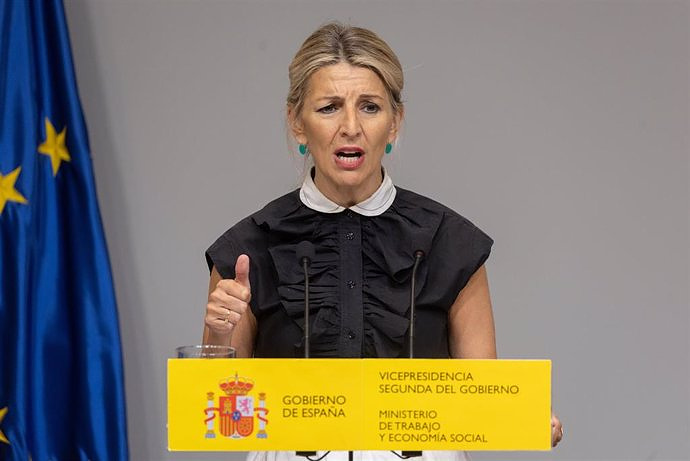The conservative bloc unsuccessfully tries to get Conde-Pumpido's wife to abstain from voting
MADRID, 20 Dic. (EUROPA PRESS) -
The members of the General Council of the Judiciary (CGPJ) have held their first vote on Tuesday to elect the two candidates for the Constitutional Court (TC) that they are responsible for appointing, but they have not reached any agreement because both blocks, the progressive and the conservative , have remained in their respective positions, which means moving the agreement away to next year.
As reported by the CGPJ itself, of the three candidates in contention --José Manuel Bandrés, from the progressive sector; and Pablo Lucas and César Tolosa, on behalf of the conservative bloc-- none have obtained the eleven votes necessary to be nominated for the TC.
The vote resulted in 10 votes for Tolosa and Lucas --the 10 votes contributed by the conservative members-- and 7 votes for Bandrés, all that the progressive wing could cast.
This is the result anticipated by the CGPJ sources consulted by Europa Press, since the problem lies in the tacit veto of Bandrés by the conservative majority, on the one hand, and in the refusal of his progressive colleagues to reopen the range of candidates, on the other.
It should be remembered that the current voting rules in the Council to appoint candidates for the Constitutional Court allow each of the 18 current members to propose and vote for a maximum of two candidates and, for there to be an election, they require a majority of three fifths (at least 11 votes).
Another of the points of friction in this extraordinary plenary session has been the participation in it of Clara Martínez de Careaga. A group of conservative members has asked that she abstain from deliberation and voting, alleging that she has a direct interest in her result because she is the wife of TC magistrate Cándido Conde-Pumpido. The sources explain that she has refused and has had the support of a large majority, beyond the members of the progressive wing.
The reason given by the members who asked to remove it is that their impartiality could be affected by the fact that the candidates who are finally sent to the TC will participate in the vote to elect the new president of the guarantee court, since Pedro González-Trevijano , currently in that position, will be one of those replaced by the newcomers and Conde-Pumpido opts for the position.
The sources explain that one of the factors influencing the negotiations within the CGPJ on the two candidates for the TC is the eventual presidency of Conde-Pumpido. Specifically, how will the balance of forces be in the progressive and conservative blocks of the Constitutional when their new members disembark in order to facilitate the former State Attorney General being chosen among his peers as the new president of the court.
The vocal Enrique Luscas, also integrated into the progressive block of the CGPJ, has had to abstain because his brother was one of the three candidates who were voted on Tuesday, all of them Supreme Court magistrates.
This move in the governing body of the judges occurs one day after the conservative majority of the TC stopped the challenges formulated by United Podemos first and PSOE later against González-Trevijano and the magistrate Antonio Narváez, thus prevailing over the progressive minority, of which Conde-Pumpido is a part.
The parties argued that González-Trvijano and Narváez had a "direct interest" in the reform aimed at renewing the TC itself because, if it went ahead, the two magistrates would be immediately replaced by the candidates nominated by the Government -- the former Minister of Justice Juan Carlos Campo and the former high office of Moncloa Laura Díez--. The conservative majority rejected it, arguing that it was not the right procedural moment.
It is the first time that the members have voted for potential candidates for the TC since the Cortes Generales returned their power to appoint magistrates of the guarantee court last July, a power that a legal reform deprived them of in March 2021 for being in office , a situation in which they have been for more than four years.
Although the second reform of the Organic Law of the Judiciary (LOPJ) set the deadline for appointing their two candidates for the TC on September 13, both appointments are still pending.
Until now, the progressive wing urged sending the duo to the Constitutional Court. Thus, in October he put on the table a first list of nine candidates that a month later he reduced to one: Bandrés.
The conservative sector, for its part, had delayed the issue of appointments, first stressing the need to refine the rules of the game and then demanding that their progressive peers add names to Bandrés's.
The dynamics were reversed when PSOE and Unidas Podemos included in the bill to repeal the crime of sedition two amendments to reform the system of election and arrival of the two candidates to the TC.
According to sources from the governing body of the judges, the reason is that the proposed reform favored Bandrés being elected, by preventing each member from proposing and voting for more than one candidate. In addition, it allowed the obstacles to be cleared for Campo and Díez to take possession of the TC without waiting for the two from the CGPJ.
After the parliamentary movement, the conservative members urged to convene the extraordinary plenary session on Tuesday, despite the fact that there was already an ordinary one scheduled for Thursday, because on December 22 the Senate was expected to definitively approve both amendments.
At first, the interim president of the CGPJ, Rafael Mozo, refused due to a formal defect: they did not accompany their request with any candidacy. In response, the conservative block revealed its candidates for the first time: Lucas and Tolosa.
For their part, the progressive members slipped the need to wait for Congress and the Senate to approve the proposed reform to vote now with the new rules.
However, the decision adopted by the Constitutional Court on Monday night, when it urgently suspended the processing of said amendments in the Senate -as claimed by the PP in an appeal for amparo-, once again caused a change of roles.
Thus, the sources consulted find it difficult to reach an agreement if the progressive members cling to the candidacy of Bandrés and their conservative counterparts insist on their tacit veto of this magistrate of the Third Chamber of the Supreme Court.
The same sources point out that the unsuccessful vote on December 20 means postponing the eventual agreement on the two candidates for the TC to next year, since on the agenda of the ordinary plenary session on December 22, the issue of appointments does not even appear. to the guarantee court.
Meanwhile, the four TC magistrates whose mandate expired on June 12 -- González-Trevijano and Narváez, and the vice president, Juan Antonio Xiol, and Santiago Martínez-Vares -- are still waiting for their relief.
Since the Executive launched the names of Campo and Díez, the main stumbling block are the legal doubts about the possibility that these four magistrates, who make up the third that the Constitution entrusts to renew the Government and CGPJ (with two each), can be replaced without the complete 'pack'.

 Exploring Cardano: Inner Workings and Advantages of this Cryptocurrency
Exploring Cardano: Inner Workings and Advantages of this Cryptocurrency Seville.- Economy.- Innova.- STSA inaugurates its new painting and sealing hangar in San Pablo, for 18 million
Seville.- Economy.- Innova.- STSA inaugurates its new painting and sealing hangar in San Pablo, for 18 million Innova.- More than 300 volunteers join the Andalucía Compromiso Digital network in one month to facilitate access to ICT
Innova.- More than 300 volunteers join the Andalucía Compromiso Digital network in one month to facilitate access to ICT Innova.-AMP.- Ayesa acquires 51% of Sadiel, which will create new technological engineering products and expand markets
Innova.-AMP.- Ayesa acquires 51% of Sadiel, which will create new technological engineering products and expand markets Cos bids farewell to Congress warning that the lack of political consensus "affects economic prospects"
Cos bids farewell to Congress warning that the lack of political consensus "affects economic prospects" Two workers died and one injured when two floors collapsed in a building under construction in Fuencarral
Two workers died and one injured when two floors collapsed in a building under construction in Fuencarral The Government will wait until after the European elections to propose measures on democratic regeneration
The Government will wait until after the European elections to propose measures on democratic regeneration The PP sees Puente as Sánchez's "servant" and the PSOE as a "sect", and the minister accuses them of putting on a show
The PP sees Puente as Sánchez's "servant" and the PSOE as a "sect", and the minister accuses them of putting on a show How Blockchain in being used to shape the future
How Blockchain in being used to shape the future Not just BTC and ETH: Here Are Some More Interesting Coins Worth Focusing on
Not just BTC and ETH: Here Are Some More Interesting Coins Worth Focusing on They develop devices for the precise diagnosis of cancer patients
They develop devices for the precise diagnosis of cancer patients UMH researchers are working on a high-quality apricot crop that requires less irrigation water
UMH researchers are working on a high-quality apricot crop that requires less irrigation water The UPV develops an application to improve the quality of life of patients with glioblastoma
The UPV develops an application to improve the quality of life of patients with glioblastoma A sensor system obtains the fingerprint of essential oils and detects if they have been adulterated
A sensor system obtains the fingerprint of essential oils and detects if they have been adulterated A million people demonstrate in France against Macron's pension reform
A million people demonstrate in France against Macron's pension reform Russia launches several missiles against "critical infrastructure" in the city of Zaporizhia
Russia launches several missiles against "critical infrastructure" in the city of Zaporizhia A "procession" remembers the dead of the Calabria shipwreck as bodies continue to wash up on the shore
A "procession" remembers the dead of the Calabria shipwreck as bodies continue to wash up on the shore Prison sentences handed down for three prominent Hong Kong pro-democracy activists
Prison sentences handed down for three prominent Hong Kong pro-democracy activists ETH continues to leave trading platforms, Ethereum balance on exchanges lowest in 3 years
ETH continues to leave trading platforms, Ethereum balance on exchanges lowest in 3 years Investors invest $450 million in Consensys, Ethereum incubator now valued at $7 billion
Investors invest $450 million in Consensys, Ethereum incubator now valued at $7 billion Alchemy Integrates Ethereum L2 Product Starknet to Enhance Web3 Scalability at a Price 100x Lower Than L1 Fees
Alchemy Integrates Ethereum L2 Product Starknet to Enhance Web3 Scalability at a Price 100x Lower Than L1 Fees Mining Report: Bitcoin's Electricity Consumption Declines by 25% in Q1 2022
Mining Report: Bitcoin's Electricity Consumption Declines by 25% in Q1 2022 Oil-to-Bitcoin Mining Firm Crusoe Energy Systems Raised $505 Million
Oil-to-Bitcoin Mining Firm Crusoe Energy Systems Raised $505 Million Microbt reveals the latest Bitcoin mining rigs -- Machines produce up to 126 TH/s with custom 5nm chip design
Microbt reveals the latest Bitcoin mining rigs -- Machines produce up to 126 TH/s with custom 5nm chip design Bitcoin's Mining Difficulty Hits a Lifetime High, With More Than 90% of BTC Supply Issued
Bitcoin's Mining Difficulty Hits a Lifetime High, With More Than 90% of BTC Supply Issued The Biggest Movers are Near, EOS, and RUNE during Friday's Selloff
The Biggest Movers are Near, EOS, and RUNE during Friday's Selloff Global Markets Spooked by a Hawkish Fed and Covid, Stocks and Crypto Gain After Musk Buys Twitter
Global Markets Spooked by a Hawkish Fed and Covid, Stocks and Crypto Gain After Musk Buys Twitter Bitso to offset carbon emissions from the Trading Platform's ERC20, ETH, and BTC Transactions
Bitso to offset carbon emissions from the Trading Platform's ERC20, ETH, and BTC Transactions Draftkings Announces 2022 College Hoops NFT Selection for March Madness
Draftkings Announces 2022 College Hoops NFT Selection for March Madness




























